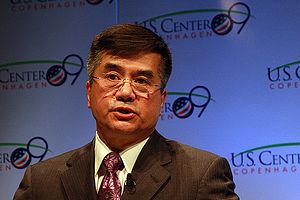The Rebalance authors Mercy Kuo and Angie Tang regularly engage subject-matter experts, policy practitioners and strategic thinkers across the globe for their diverse insights into the U.S. rebalance to Asia. This conversation with Ambassador Gary Locke – Senior Advisor at Davis Wright Tremaine LLP, Principal at Locke Global Strategies LLC, U.S. Ambassador to China (2011-2014), Secretary of Commerce (2009-2011), and 21st Governor of Washington (1997-2005) – is the 33rd in “The Rebalance Insight Series.”
Ambassador Locke, you have led U.S. public and private sector efforts to strengthen U.S.-China relations over 30 years. Describe how bilateral relations have evolved over this period.
The U.S.-China relationship is one of the most important bilateral strategic relations in the world today. When President Richard Nixon first visited China in 1972, no one could have imagined how strong the relationship would grow over four decades. The United States and China are strategically, economically and culturally intertwined. Washington and Beijing cooperate closely on major regional and global challenges, such as trying to stop the proliferation of nuclear weapons in North Korea, reducing maritime piracy in Africa, participating in joint UN peacekeeping operations, engaging in scientific collaboration on pandemics, and combating climate change.
What worries and encourages you about U.S.-China relations under a new U.S. administration?
It depends on who the next U.S. president will be. The two leading contenders – Hillary Clinton and Donald Trump – are diametrically opposed on virtually every major issue, including China. In past U.S. administrations – Democratic and Republican – U.S. policy to China has remained fundamentally consistent. Under a possible Democratic presidency, Hillary Clinton would pursue a forceful and frank approach on critical issues such as trade, security and human rights. Because Secretary Clinton understands the importance of the U.S.-China relationship and its importance to the international community, she would continue to foster a stronger relationship. Under a Republican administration, if the current frontrunner prevails, a contentious, constantly belligerent tone would adversely affect bilateral relations and the ability to work together with other regional and global powers. Belligerence and belittling would neither help advance U.S. national interests nor achieve constructive goals.
What elements of U.S. presidential leadership are critical in navigating the future of U.S.-China relations?
It is critical for the next U.S. president to take a personal interest in strengthening the U.S.-China relationship. The next president should encourage cabinet officials to visit China, invite Chinese officials to visit the United States, and engage in open and frank discussion on key issues. Developing a rapport with China’s President Xi Jinping will enable the leaders of both countries to speak candidly, openly and frequently. Through people-to-people exchanges and more visitations between both countries, Chinese and American people are learning each other’s culture and history. Finding common ground through education, the arts, tourism, commerce, philanthropy, and technology facilitates greater understanding of each other and strengthens relations. Effective public diplomacy begins with people to people exchange.
What might the next phase of U.S. rebalance to Asia look like under a new U.S. presidency?
Again, it really depends on the next U.S. leadership. Secretary Clinton had a direct role in formulating and developing the U.S. rebalance to Asia. She understands that greater attention must be given to the Asia-Pacific region. It is difficult to speculate how or whether a potential Republican president might change America’s Asia policy. It is, nevertheless, essential for the next U.S. president to understand that 90 percent of the world’s consumers lives outside of the United States. Therefore, growth of the U.S. economy depends on exports to other parts of the world. Asia’s rapidly rising middle class will continue to want high quality American goods and services, which means more jobs for Americans.
As the first Chinese American to serve as U.S. ambassador to China, what was your approach and attitude in connecting with the Chinese people?
My family and I traveled throughout China. Everywhere we went the Chinese people received us with warmth and friendliness. When we visited my ancestral home, we were mobbed by the local villagers waiting to take pictures with us. It was a deeply moving experience for my children to see where their grandfather and great grandfather were born. Living in China motivated my children to improve their Mandarin language skills. They also learned to appreciate their way of life in America and realized how fortunate they are. In representing the President of the United States, America and the American people, I remained true to myself to be friendly, down-to-earth and approachable. My Chinese ancestry gave me a deeper perspective on Chinese thinking, which guided my approach and attitude in operating the U.S. embassy and consulates across China. This personal insight gave greater sensitivity to expediting the visa process for myriad Chinese who wanted to visit, study or conduct business in the United States. More than anything, my family and I sought to convey to the Chinese people the American way of living, whether going shopping or eating at a restaurant.
Mercy A. Kuo is an advisory board member of CHINADebate and was previously director of the Southeast Asia Studies and Strategic Asia Programs at the National Bureau of Asian Research. Angie O. Tang is Senior Advisor of Asia Value Advisors, a leading venture philanthropy advisory firm based in Hong Kong.

































